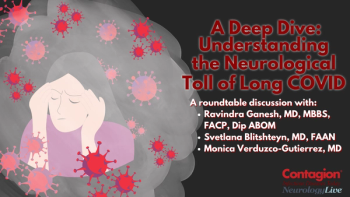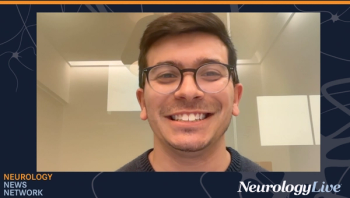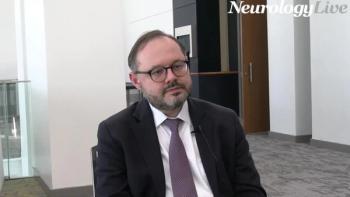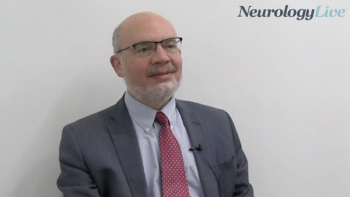
In the study, both migraine and gestational diabetes mellitus independently increase the risk of premature major cardiovascular and cerebrovascular events, with the highest risk observed among those with both conditions.

In the study, both migraine and gestational diabetes mellitus independently increase the risk of premature major cardiovascular and cerebrovascular events, with the highest risk observed among those with both conditions.

The professor of neurology at Wake Forest University School of Medicine discussed the importance of expanding the diversity of clinical trial populations, considering the impact of social determinants of health, and ensuring accessibility for high-risk underserved groups. [WATCH TIME: 4 minutes]

Semaglutide was associated with a lower risk of Alzheimer diagnosis compared to other diabetes medications, especially in older adults and women.

Without a specific tailored Long COVID therapy, individualized treatment based on patient phenotypes, along with extensive evaluations, is essential for effective symptom management.

A clinician’s guide to using a personalized medicine approach to monitor cognition in MS.

Melissa Spencer, PhD, gave commentary on her presentation from AANEM 2024, highlighting the emerging role of adeno-associated virus as a delivery system for gene therapies targeting muscular dystrophies.

The professor of neurology at NYU Grossman School of Medicine discussed the results of a phase 2b study on XEN1101, an investigational drug in development for focal epilepsy. [WATCH TIME: 4 minutes]

As part of our monthly clinician spotlight, NeurologyLive® highlighted movement disorder expert Sana Aslam, DO, an assistant professor of neurology at University of Colorado School of Medicine.

Prior to the 2025 MDA Conference, the vice president of Public Policy & Advocacy at the Muscular Dystrophy Association talked about the increasing interest in gene therapy in the field of neuromuscular diseases.

Here's some of what is coming soon to NeurologyLive® this week.

CAP-003, a non-invasive gene therapy, exceeded the 30% efficacy threshold for normalizing GCase activity in patients across all doses observed.

Over months 4 through 6, 69.1% of participants on erenumab 140 mg, and 60.3% of the erenumab 70 mg group achieved MOH remission compared with 52.6% of those on placebo

Test your neurology knowledge with NeurologyLive®'s weekly quiz series, featuring questions on a variety of clinical and historical neurology topics. This week's topic is on medication overuse headaches.

In a small sample population of adolescents with myasthenia gravis, nipocalimab met its primary end point, showing a significant reduction in total serum immunoglobuin over a 24-week period.

Neurology News Network. for the week ending October 26, 2024. [WATCH TIME: 4 minutes]

Take 5 minutes to catch up on NeurologyLive®'s highlights from the week ending October 25, 2024.

The director of the myasthenia gravis clinic at Yale University provided additional insight on the MINT study of inebilizumab in myasthenia gravis, some of the subanalyses within, and next plans in the drug’s development. [WATCH TIME: 5 minutes]

Multiple sclerosis affects nearly 3 million patients worldwide; new research is helping pave the way for developing new therapies and medications that get at the defining mechanisms that trigger immune regulation loss of this unpredictable central nervous system disease.

The chief medical officer at Immunic provided clinical insight on the dual mechanism of action of vidofludimus calcium, and how its positioned as a treatment option across all MS subtypes. [WATCH TIME: 3 minutes]

David Devos, MD, PhD, a neuropharmacologist at the University of Lille, in France, discussed positive data from an early-stage study assessing InBrain Pharma’s device-assisted therapy in Parkinson disease.

The chief medical officer at Edgewise Therapeutics gave an overview of the mechanism of EDG-5506, an agent in development for Becker muscular dystrophy, and its early promising clinical results to date. [WATCH TIME: 6 minutes]

Fumihiko Urano, MD, PhD, principal investigator of the phase 2 HELIOS trial, discussed some of the notable findings from the study, as well as the potential of AMX0035 to treat patients with Wolfram syndrome.

The senior scientist at Sunnybrook Research Institute talked about both the opportunities and challenges with the shift of technological advancement in medical education, especially in fostering critical thinking and managing the vast influx of information. [WATCH TIME: 4 minutes]

The professor of neurology at NYU Grossman School of Medicine provided clinical insight on the uniqueness of investigational XEN1101 and the idea behind potassium channel inhibitors to treat epilepsy. [WATCH TIME: 3 minutes]

Based on the positive data, the company plans to begin a phase 3 trial assessing FLT203 in patients with Gaucher disease type 1 in the second half of 2025.

Mind Moments®, a podcast from NeurologyLive®, brings you an exclusive interview with Anne Marie Morse, DO, FAASM. [LISTEN TIME: 12 minutes]

ArthemiR, a placebo-controlled study, primarily evaluates the safety of ATX-01 in myotonic dystrophy type 1, with other assessments that include target engagement and measures associated with muscle function.

The professor of neurology at Wake Forest University School of Medicine talked about how the newly updated stroke prevention guideline introduces recommendations addressing cardiovascular risk in women, sedentary behavior, and groundbreaking treatments. [WATCH TIME: 6 minutes]

The senior scientist at Sunnybrook Research Institute in Toronto, Ontario, provided clinical insight on his lecture given at AANEM 2024, focusing on the challenges and opportunities of teaching the next generation of practitioners.

An IDMC review of unblinded interim data was positive and advised that the trials continue as planned, with time to first relapse up to 72 weeks as the primary end point.